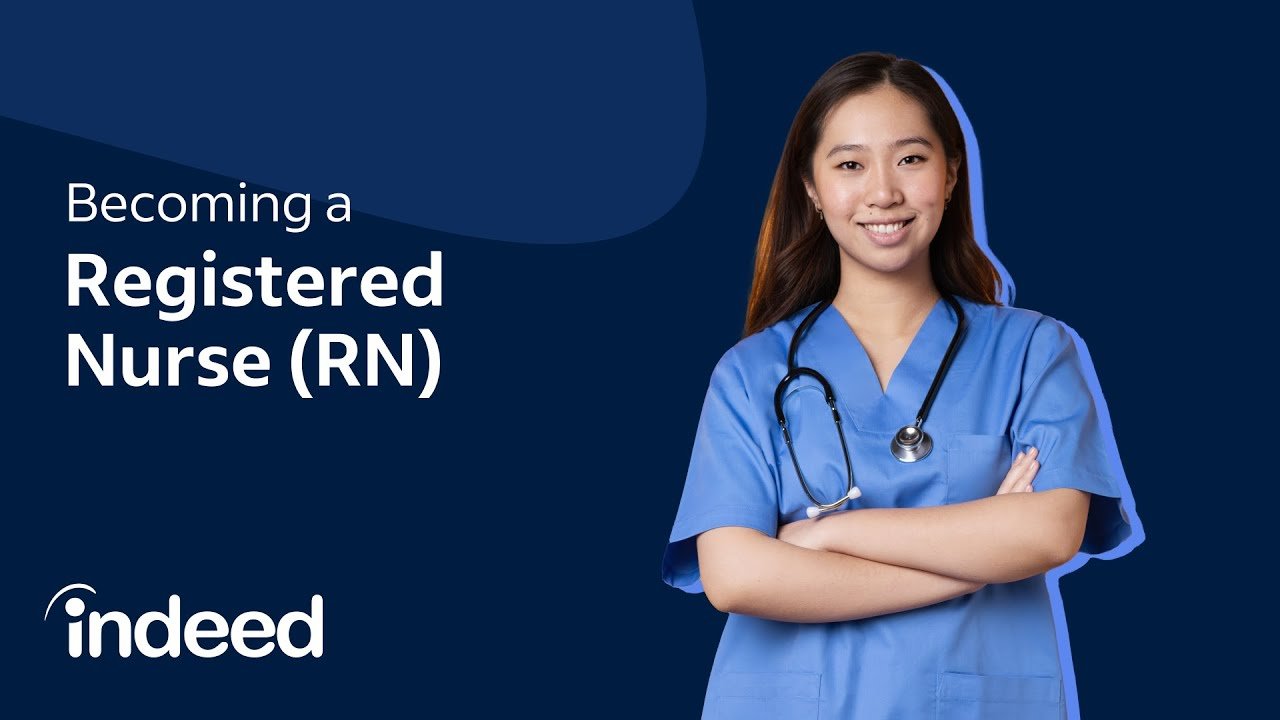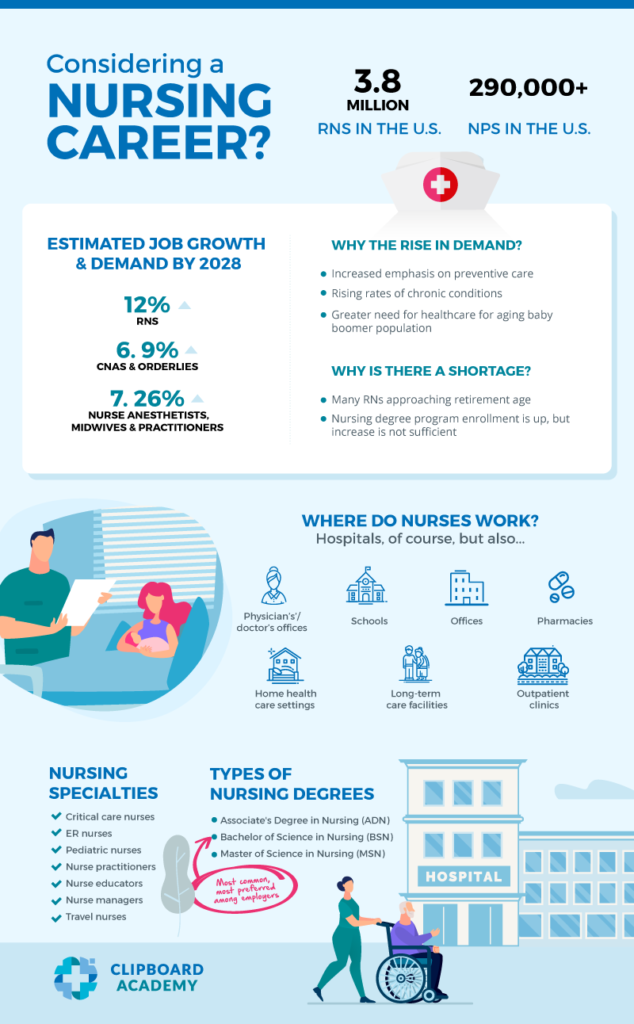So, you’re considering starting a nursing career in the USA. That’s fantastic! Whether you’re a student exploring future career options or someone looking to change professions, this comprehensive guide will provide you with all the information you need to get started. From an overview of the nursing profession to the requirements and steps involved in pursuing a nursing career in the USA, this article will equip you with the knowledge and guidance you need to make a successful transition into this rewarding field. Let’s dive in!

This image is property of nursinglicensemap.com.
Education and Training Requirements
Obtaining a Nursing Degree
To become a nurse in the USA, you will need to obtain a nursing degree. There are several educational paths to choose from, including diplomas, associate degrees in nursing (ADN), and bachelor of science in nursing (BSN) degrees. The diploma program is typically offered by hospitals, while ADN and BSN programs are available at colleges and universities.
Obtaining a BSN degree is increasingly becoming the preferred option for many employers, as it provides a more comprehensive education that includes additional coursework in areas such as leadership, research, and community health. However, it is important to note that ADN and diploma programs also prepare students to sit for the NCLEX-RN exam, which is the national licensing examination.
Completing Clinical Rotations
During your nursing education, you will be required to complete clinical rotations. These rotations provide hands-on experience in various healthcare settings under the supervision of a registered nurse or clinical instructor. Clinical rotations are an essential part of your education as they allow you to apply what you have learned in the classroom to real-life situations. They provide opportunities to develop clinical skills, interact with patients, and collaborate with other healthcare professionals.
Passing the NCLEX-RN Exam
After graduating from a nursing program, you must pass the National Council Licensure Examination for Registered Nurses (NCLEX-RN) to become a licensed nurse. The NCLEX-RN exam is a standardized test that evaluates your knowledge and ability to provide safe and effective nursing care. It covers a wide range of topics, including pharmacology, anatomy and physiology, and nursing ethics. It is important to thoroughly prepare for the exam by using study guides, practice exams, and review courses to increase your chances of success.
Obtaining State Licensure
In addition to passing the NCLEX-RN exam, you will also need to obtain state licensure to practice nursing in the United States. Each state has its own licensing requirements, which may include background checks, fingerprinting, and additional documentation. It is important to research the specific requirements of the state where you plan to work and follow the necessary steps to obtain licensure. State licensure ensures that nurses meet the minimum competency standards for safe and effective practice.
Choosing a Nursing Specialty
Exploring Different Nursing Specialties
Once you have completed your general nursing education and obtained your RN license, you have the opportunity to choose a nursing specialty. Nursing specialties encompass a wide range of areas, including critical care, pediatrics, oncology, mental health, and more. It is important to explore the various specialties and consider which area aligns with your interests, skills, and long-term career goals. You can research different specialties online, speak with practicing nurses in different fields, and even shadow nurses in specialties that interest you to gain a better understanding of what each specialty entails.
Researching Job Opportunities
When choosing a nursing specialty, it is important to consider the job opportunities available in that field. Take the time to research the demand for nurses in different specialties, as well as salary ranges and potential career advancement opportunities. Some specialties may have a higher demand and offer more job opportunities, while others may have specialized roles that require additional training or certifications.
Considering Personal Interests and Skills
Beyond career prospects and job opportunities, it is crucial to consider your personal interests and skills when choosing a nursing specialty. Think about the type of work environment you prefer, the patient population you enjoy working with, and the specific skills or talents you possess. For example, if you enjoy working with children, pediatric nursing may be a good fit for you. If you have a strong interest in mental health, you may consider pursuing a career in psychiatric nursing. By aligning your interests and skills with a nursing specialty, you are more likely to find fulfillment and success in your chosen career path.

This image is property of images.squarespace-cdn.com.
Finding a Nursing School
Researching Accredited Programs
When searching for a nursing school, it is important to consider accredited programs. Accreditation ensures that a program meets quality standards and provides a solid education. Look for programs that are accredited by recognized accrediting bodies such as the Accreditation Commission for Education in Nursing (ACEN) or the Commission on Collegiate Nursing Education (CCNE). Accreditation signals that the program has undergone rigorous evaluation and has met established criteria for faculty qualifications, curriculum, student outcomes, and resources.
Comparing Program Curricula
When evaluating nursing schools, it is important to compare program curricula. Look for programs that offer a well-rounded curriculum that includes both classroom instruction and clinical experiences. Consider the courses and clinical rotations offered, as well as any specialized tracks or concentrations that align with your interests. Additionally, explore the faculty-to-student ratio and the level of support provided to students, as these factors can greatly impact your educational experience.
Considering Location and Cost
Location and cost are important considerations when choosing a nursing school. Think about whether you prefer to attend a school close to home or if you are open to relocating. Consider the cost of tuition, fees, and living expenses, and determine if financial aid options are available. It may also be beneficial to evaluate the proximity of clinical sites and potential job opportunities in the area.
Applying to Nursing Schools
Once you have researched and compared nursing programs, it is time to apply. The application process may vary depending on the school, but typically involves submitting an application, transcripts, letters of recommendation, and a personal statement or essay. Be sure to carefully follow the instructions provided by each school and meet any application deadlines. It is also a good idea to contact schools directly to learn more about their specific requirements and any additional materials that may be needed.
Financial Considerations
Scholarships and Grants
Pursuing a nursing education can be costly, but there are various scholarships and grants available to help offset these expenses. Scholarships are typically awarded based on academic achievements, financial need, or specific demographics. Grants, on the other hand, are often based on financial need and do not need to be repaid. Research and apply for as many scholarships and grants as possible to maximize your financial assistance.
Student Loans
Student loans are another option for financing your nursing education. These loans must be repaid, typically with interest, after you graduate. It is important to carefully consider your loan options and borrow responsibly. Explore federal student loan programs, which often offer more favorable terms and repayment options compared to private loans. Be sure to understand the terms and conditions of any loans you are considering, including interest rates, repayment plans, and any deferment or forgiveness opportunities that may be available.
Work-Study Programs
Some nursing schools offer work-study programs that allow students to work part-time while attending school. These programs provide an opportunity to gain practical experience in a healthcare setting while earning a paycheck. Work-study positions can vary, but may include roles such as nursing assistants or administrative support staff. Participating in a work-study program can help offset educational expenses and provide valuable experience and networking opportunities.
Tuition Reimbursement
If you are already working in a healthcare setting, you may be eligible for tuition reimbursement from your employer. Many hospitals and healthcare organizations offer tuition reimbursement programs as a way to invest in their employees and encourage career advancement. These programs typically require you to commit to working for the organization for a certain period of time after completing your degree. Tuition reimbursement can significantly reduce the financial burden of pursuing a nursing education and can also provide additional job security.

This image is property of i3.ytimg.com.
Navigating Clinical Rotations
Understanding Clinical Placement Processes
Clinical rotations are a critical component of nursing education and provide hands-on experience in a variety of healthcare settings. However, the process of securing clinical placements can be complex and competitive. Each nursing program has its own process for matching students with clinical sites, and factors such as availability, experience level, and location can influence the placement process. It is important to familiarize yourself with your program’s clinical placement policies and procedures, and communicate any preferences or concerns to your faculty or clinical instructors in a timely manner.
Building Relationships with Preceptors
During your clinical rotations, you will work closely with preceptors, who are experienced nurses responsible for guiding and mentoring students. Building positive relationships with your preceptors is essential to your success as a nursing student. Take the time to introduce yourself, show initiative, and demonstrate eagerness to learn. Seek feedback from your preceptors, ask questions, and express gratitude for their guidance. A strong relationship with your preceptor can not only enhance your learning experience but also serve as a valuable reference for future job opportunities.
Gaining Practical Experience
Clinical rotations offer the opportunity to apply theoretical knowledge in a real healthcare setting. Take advantage of these experiences by actively engaging in patient care, observing procedures, and participating in interdisciplinary care teams. Seek out opportunities to practice new skills, ask for additional responsibilities, and take initiative in providing safe and compassionate care to patients. Remember, clinical rotations are an opportunity to develop your clinical judgment, critical thinking skills, and confidence as a future nurse.
Preparing for the NCLEX-RN Exam
Understanding the Exam Format and Content
The NCLEX-RN exam is a comprehensive and challenging examination, and proper preparation is essential for success. Familiarize yourself with the format and content of the exam, which consists of multiple-choice questions that assess your nursing knowledge and ability to make safe and effective decisions. The exam covers a variety of topics, including pharmacology, nursing ethics, and client needs across the lifespan. Understanding the structure and content of the exam can help you develop a targeted study plan.
Creating a Study Plan
Creating a study plan is crucial to organizing your study time effectively. Start by identifying your strengths and weaknesses, and allocate more time to areas where you need improvement. Set realistic goals and establish a consistent study schedule that allows for adequate review of all content areas. Utilize various study resources such as textbooks, online practice questions, review courses, and study groups. Remember to take breaks, practice self-care, and maintain a balance between studying and other aspects of your life.
Utilizing Review Resources
There are numerous review resources available to help you prepare for the NCLEX-RN exam. Consider investing in review books or online resources that provide comprehensive content review, practice questions, and strategies for test-taking. Many organizations offer review courses specifically tailored to the NCLEX-RN exam, which can provide additional guidance and structure to your studying. Additionally, take advantage of online forums and discussion boards where you can connect with other nursing students and recent graduates to share study tips and experiences.
Taking Practice Tests
Taking practice tests is an effective way to assess your knowledge and identify areas that require further review. Practice tests simulate the format and content of the NCLEX-RN exam and allow you to practice time management and test-taking strategies. Analyze your performance on practice tests to identify patterns and areas of improvement. Focus on understanding the rationale behind correct and incorrect answers, as this will help you develop a deeper understanding of the content and enhance your critical thinking skills.

This image is property of clipboardacademy.org.
Obtaining State Licensure
Understanding State Licensure Requirements
Once you have passed the NCLEX-RN exam, you will need to obtain state licensure to practice nursing in the United States. Each state has its own requirements for licensure, which may include submitting an application, providing proof of education and passing scores on the NCLEX-RN exam, undergoing background checks, and completing fingerprinting. It is important to thoroughly research and understand the specific requirements of the state where you plan to work, as well as any additional documentation that may be required.
Submitting Licensure Application
To obtain state licensure, you will need to submit an application to the state board of nursing. The application may require you to provide personal information, proof of education, and verification of passing scores on the NCLEX-RN exam. Be sure to carefully complete the application, submit any required documentation, and pay any associated fees. It is important to follow all instructions provided by the state board of nursing and meet any application deadlines.
Completing Background Checks and Fingerprints
Background checks and fingerprinting are common requirements for state licensure. These processes are designed to ensure that nurses meet the moral and ethical standards necessary for safe and effective practice. Background checks may involve reviewing criminal records or conducting a comprehensive background investigation. Fingerprinting is often used to verify your identity and check for any criminal history. Follow the instructions provided by the state board of nursing for completing these requirements and provide any requested information or documentation.
Taking State Licensing Exam
In addition to passing the NCLEX-RN exam, some states may require you to pass a state-specific licensing exam. This exam tests your knowledge of state laws and regulations related to nursing practice. The format and content of the state licensing exam may vary, so it is important to study and prepare specifically for this exam if it is a requirement in your state. Consult with your nursing program or the state board of nursing for information on the state licensing exam and resources to help you prepare.
Applying for Nursing Jobs
Crafting an Impressive Resume and Cover Letter
When applying for nursing jobs, it is important to have an impressive resume and cover letter that highlight your qualifications and experiences. Your resume should include your education, clinical experience, certifications, and any relevant work experience. Use action verbs and measurable achievements to demonstrate your skills and accomplishments. Your cover letter should be tailored to each job you apply for and should express your enthusiasm, demonstrate your fit for the position, and highlight your relevant skills and experiences.
Building a Professional Network
Building a professional network is essential for finding job opportunities and advancing your career. Attend networking events, join professional nursing organizations, and connect with other healthcare professionals through online platforms. Engage in conversations, ask for advice, and seek out mentors who can provide guidance and support. Building a network allows you to stay informed about industry trends, learn about job openings, and potentially secure referrals or recommendations for future positions.
Preparing for Interviews
Preparing for interviews is crucial to presenting yourself confidently and professionally in front of potential employers. Research the organization, understand its mission and values, and familiarize yourself with common interview questions. Practice answering these questions and consider developing behavioral examples to illustrate your skills and experiences. Dress professionally, arrive early, and bring copies of your resume and any additional materials requested by the employer. Show enthusiasm, actively listen to the interviewer, and ask thoughtful questions to demonstrate your interest in the position and the organization.

This image is property of avanthealthcare.com.
Continuing Education and Specializations
Pursuing Advanced Degrees
Continuing education is an important aspect of a nursing career, allowing nurses to expand their knowledge and skills and advance their careers. Pursuing an advanced degree, such as a master of science in nursing (MSN) or a doctor of nursing practice (DNP), can open up opportunities for leadership roles, advanced practice, research, or teaching. Advanced degrees provide the opportunity to specialize in a particular area of nursing, such as family nurse practitioner, nurse educator, or nurse executive.
Obtaining Certifications
Certifications are another way to expand your nursing knowledge and demonstrate expertise in a specific area. There are numerous certification options available, ranging from specialty certifications to advanced practice certifications. Some certifications are offered by professional nursing organizations, while others are administered by independent certification bodies. Obtaining certifications can enhance your professional credibility, increase job opportunities, and showcase your commitment to continuous learning and professional development.
Attending Continuing Education Courses
Continuing education courses are designed to help nurses stay up-to-date with the latest advancements and practices in healthcare. These courses cover a wide range of topics, from evidence-based practice to advanced clinical skills. Continuing education courses can be completed online, through conferences, or through specialized training programs. Attending these courses not only enhances your knowledge and skills but also demonstrates your commitment to providing the highest quality of care to your patients.
Career Advancement and Opportunities
Exploring Leadership Roles
Nursing offers numerous opportunities for career advancement into leadership roles. Nurses can aspire to become nurse managers, charge nurses, directors of nursing, or even chief nursing officers. Leadership roles in nursing involve overseeing daily operations, managing staff, and making strategic decisions to ensure high-quality patient care. Develop your leadership skills through additional education, professional development opportunities, and seeking out mentorship from experienced leaders in the field.
Gaining Experience in Specialized Areas
Gaining experience in specialized areas can open doors to unique career opportunities. Consider pursuing experiences in specialized areas such as critical care, emergency nursing, or labor and delivery. These experiences allow you to develop advanced skills and knowledge in a specific area of practice. Seek out opportunities for cross-training or specialized training programs offered by your employer or professional organizations. Gaining expertise in a specialized area can lead to increased job opportunities, higher salaries, and greater professional satisfaction.
Considering Advanced Practice Nursing
Advanced practice nursing offers additional opportunities for career advancement and increased autonomy. Advanced practice registered nurses (APRNs) have specialized education and clinical training that allows them to provide a higher level of care to patients. APRNs include nurse practitioners, certified nurse-midwives, clinical nurse specialists, and certified registered nurse anesthetists. Advanced practice nurses can diagnose and treat patients, prescribe medications, and often have the ability to practice independently. Pursuing advanced practice nursing can open up a wide range of career possibilities and allow you to make a significant impact on patient outcomes.
Joining Professional Organizations
Joining professional nursing organizations can provide numerous benefits for your career. These organizations offer opportunities for professional development, networking, and continuing education. They often provide resources such as journals, access to research, and opportunities for leadership roles within the organization. Joining professional organizations allows you to stay informed about industry trends, advocate for the nursing profession, and connect with like-minded professionals who share your passion for nursing.
In conclusion, starting a nursing career in the USA requires obtaining a nursing degree, completing clinical rotations, passing the NCLEX-RN exam, and obtaining state licensure. Choosing a nursing specialty involves exploring different specialties, considering job opportunities, and evaluating personal interests and skills. Finding a nursing school involves researching accredited programs, comparing program curricula, considering location and cost, and applying to schools. Financial considerations include scholarships and grants, student loans, work-study programs, and tuition reimbursement. Navigating clinical rotations involves understanding placement processes, building relationships with preceptors, and gaining practical experience. Preparing for the NCLEX-RN exam involves understanding the format and content, creating a study plan, utilizing review resources, and taking practice tests. Obtaining state licensure involves understanding state requirements, submitting an application, completing background checks and fingerprints, and taking any required state licensing exams. Applying for nursing jobs requires crafting an impressive resume and cover letter, building a professional network, and preparing for interviews. Continuing education and specializations involve pursuing advanced degrees, obtaining certifications, and attending continuing education courses. Lastly, career advancement and opportunities involve exploring leadership roles, gaining experience in specialized areas, considering advanced practice nursing, and joining professional organizations. By following these steps and taking advantage of the resources and opportunities available, you can embark on a successful and fulfilling nursing career in the USA.